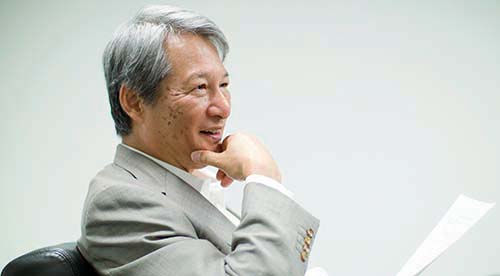Home > Highlighting JAPAN >Highlighting Japan November 2013>40th Year of ASEAN-Japan Friendship and Cooperation
Highlighting JAPAN
40th Year of ASEAN-Japan Friendship and Cooperation
Dr. Shiraishi interview

For Japan and ASEAN to carve out a new history as equal partners, the important key will be to build a new relationship in anticipation of the changing era. In continuing to grow together, what will be expected of Japan? Dr. Takashi Shiraishi is the president of GRIPS (the National Graduate Institute for Policy Studies) and an expert in Asian politics and international relations, we asked him about some of the issues that Japan should tackle in further strengthening the relationship with ASEAN at the same time as looking back at the path that have been taken so far.
Shiraishi stated that in terms of its importance to Japan, the Japan-ASEAN relationship comes second to the Japan-US relationship.
In 1977 Prime Minister Takeo Fukuda introduced what is now called the Fukuda Doctrine which has the heart-to-heart conversation at the base of the Japan-ASEAN relationship. The Fukuda Doctrine still holds a very significant place as was seen in January this year when Prime Minister Shinzo Abe released a statement that he will inherit the Fukuda Doctrine in the future diplomacy towards ASEAN.
Shiraishi explains that there were a couple of big changes that took place in the 1990s. One of which occurred after Viet Nam's withdrawal from Cambodia and the implementation of the Cambodian Peace Settlement. Japan's very first post-war international peace keeping operation took place then. Second is Japan's support of the integration of the 6 ASEAN countries as well as of Indochina. Third is the Economic crisis of 1997-1998 where Thailand, Indonesia and Malaysia were severely affected. The Asia Monetary Fund to monitor East Asian economies for currency stability and to provide support in times of economic crisis was informally proposed by the Japanese government in response to the devastation but did not go through. However, what did happen was 10 years was spent in building virtually the same system, now called the Chang Mai Initiative (CMI) to prevent this region from ever getting hit by such a destructive economic crisis.
When we asked how he thinks the Japan-ASEAN relationship will transform in the next 10 or 20 years, he explains that in the past 10 years, Japan lent a hand in establishing a stable ASEAN, as well as a stable East Asia. Due to this, ASEAN's economy is growing and according to the International Monetary Fund (IMF), the economy will be approximately the same as Japan's by the year 2030 and he states "ASEAN will become very important". "Therefore there are a few significant discussions that need to take place between Japan and ASEAN. First and foremost, is the discussion of how to develop each individual nation in a time when liberalization of trade is taking place. Second is how to prevent their economies from getting stuck in the middle income group. To aim for a further prosperous and stable Asia, Japan and ASEAN needs to work closely with each other."
"The most important thing currently is to welcome people who will become globally active from ASEAN as well as other parts of the world. In order to do that, Japan should make every effort in creating an environment in which even people with limited Japanese capability are able to feel comfortable" Shiraishi adds.
"The next step for Japan is to help strengthening the unity of the ASEAN, raise the capacity of each ASEAN nation in terms economic cooperation, human resource development, and the adjustment and upgrading of infrastructure."
Furthermore, due to visas being easier to obtain or no longer required for visitors from countries such as Thailand, Malaysia, Viet Nam, Philippines and Indonesia there is a visibly large flow of ASEAN population into Japan. In such a time, Shiraishi predicts that "beginning with ASEAN, Japanese companies will start to appoint people from Asia instead of only Japanese as their senior officials. In about 10 years, it could easily be possible that the CEO of a renowned Japanese company would be a non-Japanese. As a result, Japanese companies will start doing very well outside of Japan."
Shiraishi strongly emphasizes that "To educate people will become one of the most important tasks for Japan in playing a part in the growth of Asia as a whole."
© 2009 Cabinet Office, Government of Japan






